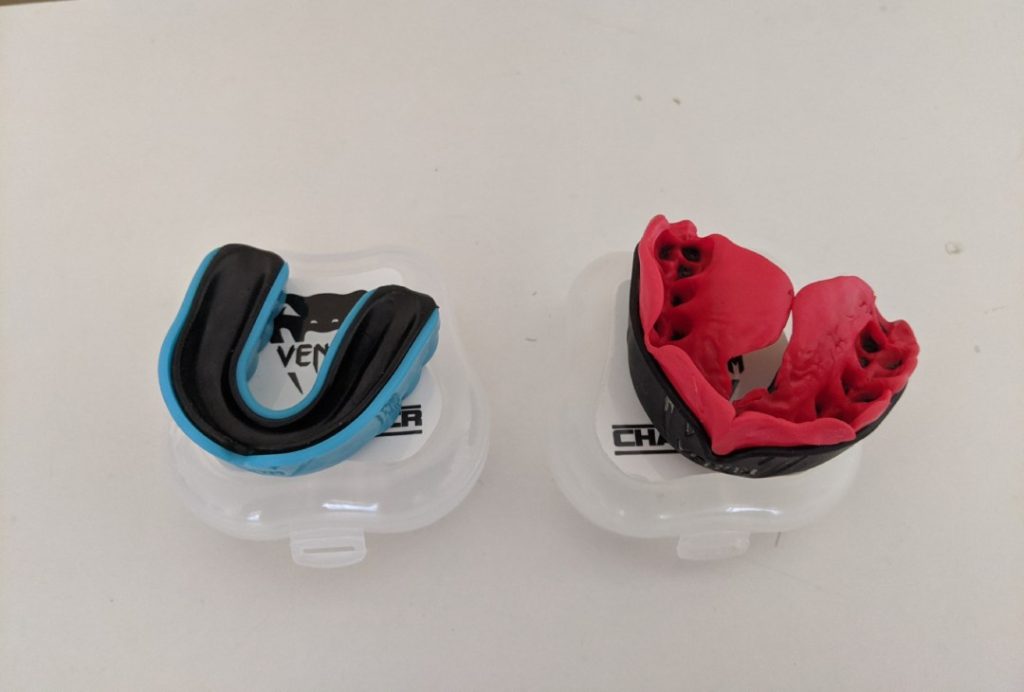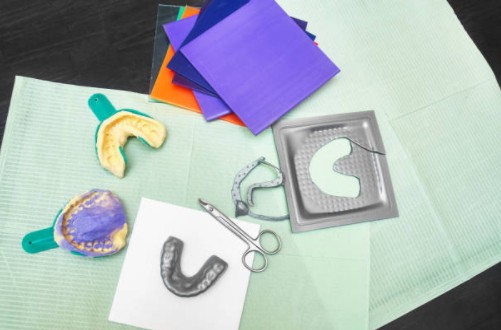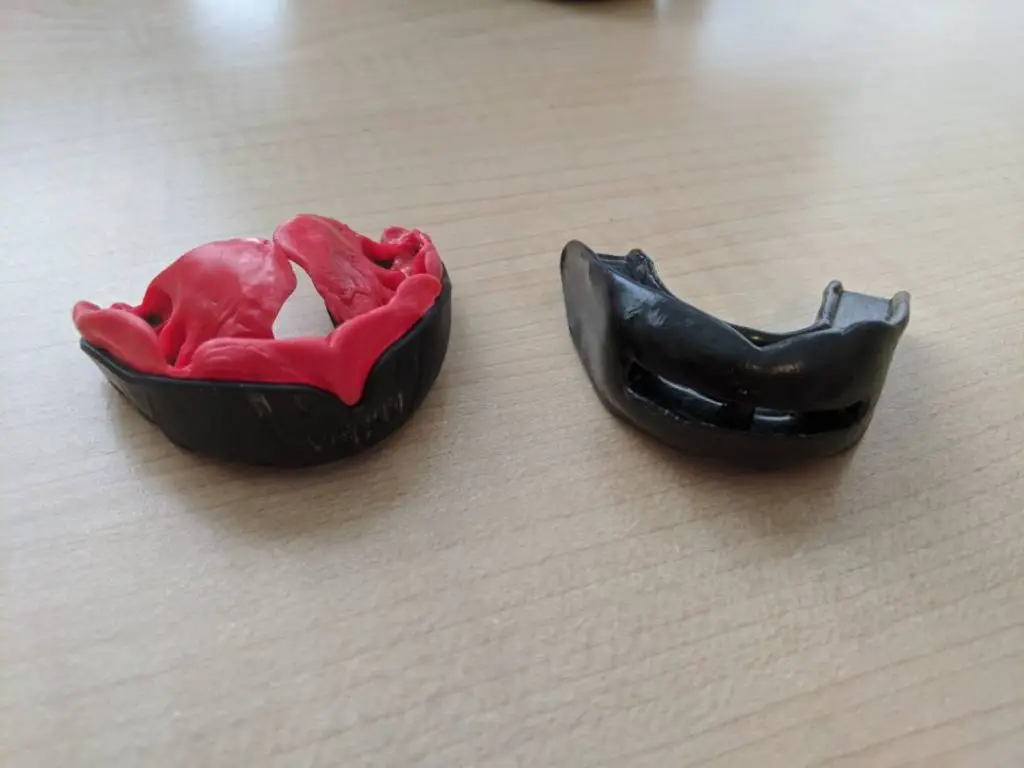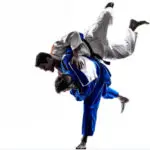Did you just start Jiu-Jitsu and notice everyone is putting something in their mouth when rolling starts? Maybe you’ve been doing Jiu-Jitsu for a while and never really thought about if you need a mouthguard or not. This article will go through what a mouthguard offers and if you need it for Jiu-Jitsu.
All impact sports pose a risk of injury to the lips, teeth, gums, and tongue. That is why the use of a mouthguard is necessary to avoid cuts, lacerations, fractures, bites, and many more damages in those areas.
A mouthguard for Brazilian Jiu-Jitsu is not required, but it is highly recommended – especially in competition. A mouthguard will help prevent damage to your teeth, lips, gums, and tongue. Using a single mouthguard that is at least 4mm thick will provide adequate protection when molded to the mouth correctly.

What Is A Mouthguard?
A mouthguard is an implement that can be defined as a device made of various materials, which is introduced into the mouth by placing it in the area of the teeth, because of its resistance, the probability that an athlete has to suffer injuries that compromise the oral area is reduced.
Therefore, it can be said that the mouthguard is a fundamental protective element for those who engage in impact sports such as Brazilian Jiu-Jitsu. BJJ focuses on grappling and does not incorporate any striking; however, is still a combat sport where some impact or accidental falls may occur.
What Does A Mouthguard Do?
It is important to note that not only is it a matter of using any mouthguard at the time of practicing the sport, but the mouthguard must fit the individual’s dental arch correctly.
That is to say, that it has adequate support, retention, and stability in the oral cavity so that it does not suppose a discomfort and at the same time it makes its function correctly. At the same time, it should be comfortable and not irritate or hurt the soft tissues around the teeth: the gum and the inner cheek.
Also, it should allow the wearer to breathe properly (otherwise performance and efficiency may be compromised), and to speak and swallow liquids.
Custom Or Off-The-Shelf?
Custom mouthguards, being correctly designed for each person, and providing an adequate fit, are the ones that offer the most protection when it comes to avoiding oral trauma.
Off-the-shelf mouthguards should provide sufficient protection; however, if you are serious about BJJ it might be a good investment to get a custom mouthguard.

This is because regular or prefabricated mouthguards can become loose and fall out of position, so the athlete would have to constantly reposition it (needing to be focused on two things at once) and at the same time, the mouthguard would not be fulfilling its protective function properly.
Importance Of A Mouthguard
A mouthguard with good retention protects teeth and other oral structures around them from damage by impact. They reduce the intensity of the impact transmitted to the brain when a direct blow to the jaw is produced, (this type of blow is not practiced in Brazilian Jiu-Jitsu, but being an impact sport there is always the possibility of some accidental hit or failure in the defense).
Some specialists suggest that a mouthguard with adequate retention, fit, and stability produces a repositioning of the jaw which is an improvement for the temporomandibular joint (the one that joins the jaw to the skull).
This increases blood flow and oxygen delivery to the tissues, and the more oxygen you have, the better your concentration, performance, and strength.
Another important aspect is the feeling of security and confidence that the use of the mouthguard provides, which allows you to be more focused on the class instead of any possible injury.
Single Or Double Mouthguard?
There are single and double mouthguards. The single mouthguard consists of only one protector that is located on the upper teeth/dental arches. A double mouthguard consists of a protector that covers both the upper and lower teeth/arches.
The bottom portion of the double mouthguard isn’t necessary to protect the bottom teeth, but more to protect the jaw. The bottom portion of the double mouthguard prevents the jaw from moving.
If you’re looking for more detailed information about single mouthguards and double mouthguards check out my article: Single Vs Double Mouthguards.

Here is a quick overview of the benefits of using a single mouthguard over a double one are and why they are more popular:
- It does not compromise breathing since it covers only a part of the mouth. And although the double mouthguard has holes in its structure these can be very small so the amount of air that penetrates can be little.
- Because they are smaller they are usually considered more comfortable, being the doubles more voluminous so they can produce discomfort if it is not well adjusted.
- When it comes to regular or prefabricated mouthguards, the single ones usually have a better adjustment.
Frequently Asked Questions About Mouthguards
Most people starting in Brazilian Jiu-Jitsu have questions about using mouthguards, so I’ve compiled the most frequently asked questions for your information.
What Type Of Protection Does A Single Mouthguard Provide?
Single mouthguards prevent direct contact between the upper and lower teeth and thus keep them from breaking, injuring, or moving out of place in the bone that supports them.
Likewise, they protect the other structures that make up the oral cavity: lips, gums, tongue, inner cheek. And it is designed to contain the impact of the blows.
As mentioned above, they are usually designed to be placed on the upper teeth since these, due to their position (they stick out more than the lower ones), are more prone to suffer some injury.
Does A Double Mouthguard Offer More Protection To The Teeth?
A single mouthguard, even if it is only located in one of the arches, can provide as much protection as a double one, since the most important thing is that it has correct retention and stability to remain fixed in its position.
Now, in case of a person who uses braces, he or she must use a double mouthguard since it prevents the orthodontic appliance from injuring the inner cheek, the lips, or the gums in case of an impact.
Is Protection From A Single Mouthguard Enough For Jiu-Jitsu?
Considering that Brazilian Jiu-Jitsu is a sport where no direct hits are usually made, a single mouthguard is more than sufficient and fulfills its function perfectly in the event of an accidental impact.
Likewise, the teeth of the lower jaw is a little more retracted than the upper ones, already has more protection, so it’s enough to use a single mouthguard to protect only the upper region to avoid direct contact between dental arches.
Why Is A Mouthguard Important To Use In BJJ?
Mainly because they serve as a barrier that allows to cushion the impact of a possible blow, avoiding dental fractures, bites, cuts, etc. This, in turn, prevents rests due to injuries or to undergo expensive restorative treatment.
In the case of Brazilian Jiu-Jitsu, this is a way to anticipate any accidents that may occur, since direct impacts to the facial area are not common.
Are Thin Mouthguards Sufficient For Jiu-Jitsu?
There are several types of thicknesses which offer different levels of impact containment.
Ideally, the mouthguard should be thick enough to act as a barrier against impacts, which does not mean that it has to be excessively thick, being 4mm sufficient to guarantee good protection, while at the same time producing a feeling of comfort.
On the other hand, 2mm mouthguards are usually considered very thin and 8mm ones can be uncomfortable for some people.
Can I Wear A Mouthguard With Braces?
Yes, and its use in people with braces is imperative to avoid lacerations in the soft tissues surrounding the teeth. And as mentioned in this type of situation, double mouthguards are recommended.
It is important to remember that when performing this type of sport, the safety of the oral tissues is fundamental, which also maintains adequate oral health, and that is why the use of mouthguards should not be omitted.
Conclusion
It is recommended that you use a mouthguard in Brazilian Jiu-Jitsu. Using a mouthguard in BJJ will help protect your teeth from getting chipped or broken from a knee, elbow, head, etc.. Additionally, a mouthguard will prevent you from biting through your tongue, lip, or gums.
Whether it is a takedown or someone passing your guard aggressively, there is always a risk of having your teeth damaged or landing the wrong way and biting your tongue. A mouthguard will help prevent these injuries. Furthermore, a single mouthguard of at least 4mm should provide enough protection in Jiu-Jitsu.
Off-the-shelf mouthguards should be sufficient as long as you’re able to properly mold it to your mouth. If you’re serious about BJJ and are considering competing it will be worth investing in a custom-molded mouthguard.



